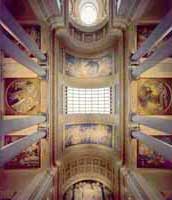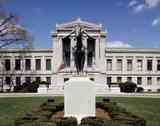|
Phaethon
John
Singer
Sargent
-- American painter
1922-1925
Museum
of
Fine Arts,
Boston
Colonnade
Stairway Side Aisle mural
Center mural
Oil on
canvas
Diameter,
unframed: 307.3 cm (120 in.)
Francis
Bartlett Donation
of 1912 and Picture Fund 25.646
Jpg: MFA
(See
interactive zoom
at the MFA)
In Greek mythology,
Phaethon
(also
spelled Phaeton) was the son of Helius who was the Sun god.
Helius
would ride his chariot across the sky to illuminate the day (He became
overshadowed by Apollo who did the same thing -- see Apollo).
According to
legend,
Phaeton wanted
to prove to his friends that Helius was his father. So one day he went
to see him. "Oh, great Helius, are you truly my father?"
"Ah yes . . ."
Helius
said, "I am
your father."
"Prove to me you
are my
father."
So Helius told him he would grant any wish he wanted to prove he was
indeed
his father.
"I want to drive
your
chariot across
the sky."
"Please son," said
Helius, "withdraw
your wish. Driving the chariot of the sun is a task that only I can do.
Not even Zeus can do it."
But Phaethon
pleaded, and
his father
relented wanting to please his son. "Do not fly too high or too
low.
Stay at the middle path." (1)
So as Phaethon took
the
chariot up
into the clouds, all was going well for a while, but soon the
horses
discovered it was a mere boy driving them and they went wild. Phaethon
couldn't control the horses and the chariot swooped down close to the
earth
burning cities, and then sailed up and out into outerspace freezing
everything.
Zeus saw what was happening and threw a thunderbolt throwing Phaethon
from
the chariot to save the earth.
* * *
 In
1878-79, Gustave Moreau gave us a straight adaptation of Phaethon. In
his
painting, we see Zeus' thunderbolt coming up as a dragon, and the
horses
are mad and out of control. In
1878-79, Gustave Moreau gave us a straight adaptation of Phaethon. In
his
painting, we see Zeus' thunderbolt coming up as a dragon, and the
horses
are mad and out of control.
But by 1922,
Sargent
wanted to give
us a more scientific and symbolic interpretation. Remember, it was in
1910
that Halley's Comet came streaking across the sky which captivated an
entire
public's imagination. Scientists and historians were actively seeking
for
meteoroid impacts all over the world and signs of other meteorological
events. Some were actively looking for a scientific basis for
mythological
stories. (2)
So in Sargent's
painting,
instead
of giving us a field of stars to represent the outer atmosphere
where
Phaethon has flown into, he gives us the astrological signs of the
night
sky. The painting is showing us after Zeus' thunderbolt has thrown
him.
Phaethon's hair is flowing back like flames with smoke streaming thick
beyond. Our poor Phaethon is now hurdling towards the the earth, along
with his chariot, just like a meteoroid.

(3)
This is new! Sargent
is
giving us
cutting edge stuff! The idea that the story of Phaethon could be about
a large meteor was actually very new, and right in line with what was
happening
in scientific and popular literature. Sargent's intent was not to give
us some outdated mythology, but to interpret it afresh.
Notes:
Provenance:
The artist;
commissioned by the MFA in 1921 and installed on ceiling side aisle,
Huntington Avenue stairway, 1925.
- See the year
in
review 1925
- See Sargent at
the Museum
of Fine Arts, Boston
- 1) Tommy
Albright's Phaethon
- 2) In 1993,
Bob
Kobres
published "Comet
Phaethon's Ride" wherein it looked at the supposition that possibly
a large meteor impact to the earth could have given rise to the
mythological
story of Phaethon. Specifically he cites a Jesuit scholar, Franz Xaver
Kugler, whom proposed this exact theory in 1927. Although this Jesuit's
paper post dates Sargent's painting, it is my contention that the idea
of it was in the public discourse and there are other cited sources of
scientists looking for meteorological impacts on the earth prior to
Sargent's
painting. A cursory view of retelling the classic story misunderstands
Sargent's work completely.
- 3) Meteor
gif: Bob's
Kobres' front page

Stairway
Ceiling Decorations
Looking
straight up

Museum
of Fine Arts, Boston
|



